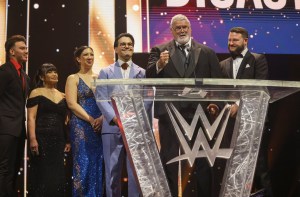According to Game of Thrones author George R.R. Martin, not even a massive flagship franchise is immune to the turmoil impacting the company and HBO Max‘s pending merger with Discovery+. A post on Martin’s Not a Blog on December 28 provided updates on several of his projects in progress, including Season 2 of Thrones spin-off House of the Dragon, the long-awaited A Song of Ice and Fire installment, The Winds of Winter, and other Game of Thrones-inspired shows in development. Among the “changes at HBO Max,” Martin briefly and vaguely discussed the cancellations of shows and films and the removal of legacy material, acknowledging they were negatively impacting development. “Some of those are moving faster than others, as is always the case with development,” Martin wrote in the blog. “None have been greenlit yet, though we are hoping … maybe soon. A couple have been shelved, but I would not agree that they are dead. You can take something off the shelf as easily as you can put it on the shelf. All the changes at HBO Max have impacted us, certainly.” Martin also discussed his upcoming projects, including another book in the Wild Cards series and an adaptation of the series that is in development at Peacock. “We are also still developing the Wild Cards tv series for Peacock, based (largely) on Fort Freak. And I have Wild Cards books to edit. Oh, and did I forget ‘Winds of Winter? No, of course I didn’t. But if I ever did, I know you folks will remind me.”
In August, Martin answered some questions about the Game of Thrones/House of the Dragon book and TV universes during an interview on The History of Westeros podcast. He said, “a little change in a long narrative can have big changes further on,” referring to the TV show’s removal of some characters from the books. In addition to these “butterfly effect” moments, he has said that sometimes writers and network executives want to change elements of the show.”We have two canons. We have the show canon, the Game of Thrones canon. And we have the Song of Ice and Fire canon,” Martin said. “And in the book canon, obviously, still writing The Winds of Winter, I’m sure you all know that, and then there’s another book beyond that. And as I write them, and I’ve said this in a previous blog post, I always knew that things were gonna be different, but as I’m writing, as the stories are coming alive, and the characters are coming alive, taking me further and further away from the show. So there’s gonna be some very considerable differences, and the book canon is gonna be quite different from the show canon as we get deeper into it.”
Videos by PopCulture.com
He continued: “There are two different canons. Now, because most of these shows that we’re developing, almost all of them are prequels. I think it’s a single canon. Because all of these prequels can lead up to Game of Thrones at the beginning.” Martin seemed to imply that the TV shows would generally adhere to the TV show canon, not the book canon, but his real concern was avoiding further divergences. “But what I wanna avoid – and I don’t know how many shows are gonna [on the air] – hopefully more than one. But, as I said, we have the book canon, and we have the show canon. What I don’t want to happen is that we have 17 show canons. Every different showrunner decides to take it in a different direction. And nothing makes any sense because there’s no consistency.” Martin contends that the question of “canon” is a central part of the book on which House of the Dragon is based, Fire & Blood. An “imaginary history book” based on the viewpoint of a Westerosi scholar, it often cites contradictory in-world sources for its own events, leaving readers uncertain of their credibility. There is no unreliable narrator in the TV show, however. “At some point it hit me: ‘why don’t I give all version?’ Because history is uncertain. I’ll give all versions, and it’ll be fun for me,” Martin said. “…but [showrunners Ryan Condal and Miguel Sapochnik], when they’re adapting it, they largely had to make up their minds.”
Most Viewed
-

US television personality Kylie Jenner arrives for the Wall Street Journal Magazine 2023 Innovator Awards at the Museum of Modern Art in New York City on November 1, 2023. The annual awards, now in their 12th year, recognize talents from a range of disciplines, including fashion, art, literature, entertainment, architecture, design, technology, and philanthropy. (Photo by Andrea RENAULT / AFP) (Photo by ANDREA RENAULT/AFP via Getty Images)







